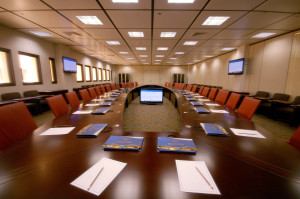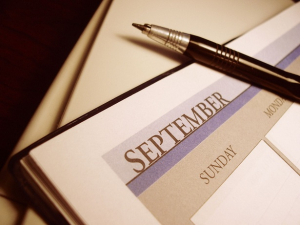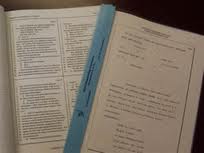 Some of the fiercest competition in a busy law firm can be competition over use of the conference rooms. Some firms have complicated reservation systems in order to try to maximize use of such valuable space. This situation may have you looking for an alternative space to use for your upcoming deposition.
Some of the fiercest competition in a busy law firm can be competition over use of the conference rooms. Some firms have complicated reservation systems in order to try to maximize use of such valuable space. This situation may have you looking for an alternative space to use for your upcoming deposition.
Or maybe you need to schedule an out-of-town deposition. Where do you begin in your search for conference room space?
Here are some places to start.
Ask your court reporter
Many larger court reporting agencies will have conference space available for your use. All you need to do when you call to schedule a deposition is let the agency know you will need to reserve a conference room. Let them know how many people you expect in attendance.
Some court reporting agencies will not only let you use their conference room but will also search for a conference room in other cities where you may need one. For instance, at O’Brien and Bails, we often will have a client call, tell us the city, and we do the legwork to find a conference room anywhere in the country. In Michigan, we have a database of conference rooms all over the state that we are search by city name or region. It’s a service we like to offer our clients that we know saves them time and money.
Borrow space from another law firm
If you refer clients, on occasion, to other area law firms, call and ask if you can use their conference room. Most law firms will be happy to oblige provided the room is not already reserved.
Ask a favor of a vendor
Your firm likely has an accounting firm or local insurance agency that you use for services. These vendors can be a good source of conference room space. Again, most will be very accommodating and lend you their conference space.
Check with local courthouses
Many courthouses have extra office spaces that you can call and reserve for taking a deposition or for client conferences. Call and see if they allow you to reserve one in advance.
Reserve a hotel conference room
Most hotels have conference rooms or rooms set up for business meetings. If you cannot find space in an office setting, a hotel conference space can be a good alternative.
At O’Brien and Bails, many of our clients ask us to help them find conference room space for depositions. We have our own conference facilities in various cities for this very purpose. And if our own conference rooms are already in use, we often help our clients find space elsewhere.
To easily schedule a deposition and reserve a conference room with O’Brien and Bails, go to our online Deposition Scheduler. Our scheduler allows you to schedule a deposition at your convenience, 24/7.
 Scheduling legal depositions can be time consuming for you and your staff. Finding an available court reporter can be a chore, especially if your deposition is out of town and you don’t know any court reporters there.
Scheduling legal depositions can be time consuming for you and your staff. Finding an available court reporter can be a chore, especially if your deposition is out of town and you don’t know any court reporters there. As a court reporter, I’ve listened to thousands of depositions. My job is to take down every word so the record is completely accurate. However, there are some things attorneys do in a deposition that make it much more difficult for me to get every word. Here are the top 10 mistakes attorneys make in a legal deposition.
As a court reporter, I’ve listened to thousands of depositions. My job is to take down every word so the record is completely accurate. However, there are some things attorneys do in a deposition that make it much more difficult for me to get every word. Here are the top 10 mistakes attorneys make in a legal deposition. When you hire a court reporter, sometimes you’re working with a stenographic reporter who brings a shorthand machine to take down the record. Sometimes you may get an audio recorder, someone who is using a recording device rather than using a steno machine. Have you ever wondered if one is better than the other?
When you hire a court reporter, sometimes you’re working with a stenographic reporter who brings a shorthand machine to take down the record. Sometimes you may get an audio recorder, someone who is using a recording device rather than using a steno machine. Have you ever wondered if one is better than the other? How long have you been a court reporter?
How long have you been a court reporter?